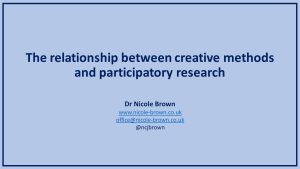
Source: NBrown
This presentation about the relationship between creative and participatory approaches to research is based on my article Scope and Continuum of Participatory Research. This video was recorded for the MPE/MeCCSA Practice Network Symposium 2021. (MPE – Media Practice and Education; MeCCSA – Media, Communication and Cultural Studies Association).
As wider social and societal changes have led to moves towards equality as a response to better understanding of inequalities, ethical considerations in research are now more consciously focussed on power dynamics. As a consequence, participatory research methods have gained in traction. Simultaneously, artistic and creative methods are used within such projects to such an extent that arts-based, creative research has become equated with participatory research. In this presentation, I pursue three arguments: Firstly, I argue that the current understanding of community-based participatory action research is not the only potential for participatory methods, and indeed should not be. Depending on the design participatory research needs to be seen as a continuum from being minimally participatory to being fully egalitarian, whereby realistically most participatory research designs are situated somewhere in between the two with the level of participation changing throughout the process. Secondly, I argue that the employment of arts-based methods for data collection or dissemination does not automatically translate into a participatory research design. Thirdly, I argue that for ethical reasons researchers should not aim for fully egalitarian research to maintain participants’ interests and wellbeing.
In building these three interrelated arguments I present interactively as a participatory and joint sense-making drawing on three different research contexts as case studies: Case study 1 refers to a practice-based enquiry within a teacher education programme that led to the creation of new methods to teach reflective practice. Case study 2 considers the development of new forms of assessment as part of an undergraduate module. Case study 3 reports on a research where participatory and arts-based methods were employed to develop a deeper understanding of individuals’ lived experiences.
The slides and resources I used for this interactive presentation can be downloaded in PDF from here.
The video below is the recorded presentation as submitted as video paper to MPE-MeCCSA.
Leave a message: